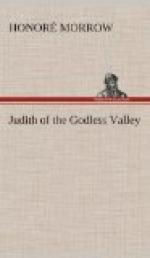The winter that Judith was twenty and Douglas twenty-two was one of the most severe ever known in Lost Chief country. It was preceded by a summer of drought and the alfalfa and wild hay fields failed. Feed could not be bought. Steers and horses died by the score. Doug did little trapping. He and his father spent the bitter storm-swept days fighting to save their stock. By March they were cutting young aspens and hauling them to the famished herds to nibble. Coyotes moved brazenly by day across the home fields, stealing refuse from the very door-yards. Eagles perched on fence-posts near the chicken runs. Jack-rabbits in herds of many score milled about the wind-swept barrens, gnawing the grass already cattle-cropped to the roots. The cold and snow persisted till mid-April, and even then Lost Chief was only beginning to thaw on its lower northern edge.
It was a winter of tremendous nerve strain. There had been little opportunity for the neighbors to get together, and the battle with the cold never ceased. John Spencer, always at his best when great physical demands were being made upon him, came through the winter better than Douglas, whose profound restlessness was beginning to tell even on his youthful strength. It was almost as much of a relief to Doug’s family as to Doug to have Charleton Falkner insist, late in April, that Doug go on a wild horse hunt with him.
It was like the opening of a prison door to the young rider. He had dwelt within himself too much, had seen too much of Judith, had been too deeply perplexed by his own relation to life. He resolved that during the week they were to be out on the hunt, he would not once permit himself a serious thought.
They left Charleton’s ranch early one morning, driving a sheep wagon which trailed four saddle horses. On the tail-board of the wagon were a bale of alfalfa and several bags of oats, for which Charleton had scraped Lost Chief to the bottom of its bins.
The snow was running off the trail in roaring streams. There was brilliant sun. Magpies dipped across the blue. Charleton drove while Douglas lay across the bunk, his spurred boots resting on an embroidered sofa cushion which he had purloined from Mary for lack of a pillow. He lay thus all day, except at meal time, neither man caring to talk. All day long, they pushed north, over the hills, each hill and valley lower than the last. When they made their night camp, the snows were gone. The next day, too, they pursued ever-dropping trails, that disappeared toward noon, leaving Charleton to find his way through barren hills that were criss-crossed only by antelope and coyote tracks. At mid-afternoon, from the crest of one of these hills they beheld a winding, black river with a flush of green along its borders. They covered the miles to this at a trot and made their camp beside the rushing waters. The eager horses almost rended harness and halter in their desire to taste the budding grass around the sage-brush roots.




